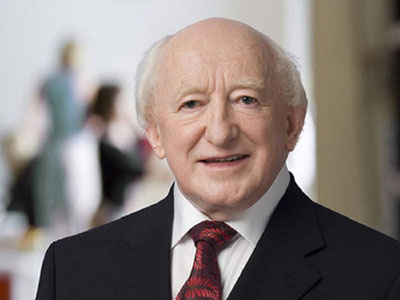Convention Centre in Dublin, Ireland, where ESOF is taking place this week
Europe’s largest science forum has opened in Dublin this evening. Speaking at the opening ceremony of the Euroscience Open Forum (ESOF), Ireland’s President Michael D Higgins has commended Irish scientific pioneers.
The president also spoke about investment in science and research and the need channel science and technological innovations towards tackling global issues such as food shortages as a result of population growth.
Higgins started off by welcoming all the guests from abroad to ESOF. In all over 4,500 delegates are expected to attend the four-day science event in Dublin, which will run until Sunday.
He also spoke about Ireland’s reputation for creativity and for our “unique and imaginative view” of the world.
“However, if the average Irish person was asked to give the basis for this worldwide reputation they would most likely cite James Joyce’s great Ulysses, or the magnificent poetry of Seamus Heaney, the plays of JM Synge or the theatre of Brian Friel or Tom Murphy in the modern period.
“Not really that many of them would mention prominent parts of the Irish intellectual achievement such as Bell’s Theorem, or the development of fibre optics in communication, or the splitting of the atom, or the Beaufort Scale, or the effectiveness of the mariner’s compass or the many other inventive and forward thinking achievements which owe their success to the innovation, creativity and original thinking of talented Irish scientists.
Higgins then went on to speak about Ireland’s scientific legacy.
“Understandably, people often think of our Nobel Laureate in Physics, Ernst Walton when considering our contribution. However, there are scores of other scientists who have laid the groundwork for the efforts we are celebrating today. Those we can rightly be proud of include Robert Boyle, often called the ‘father of chemistry’, and John Tyndall of Co Carlow and his pioneering work on radiant heat, and the germ theory of disease.”
He also spoke about the astronomer Agnes Mary Clerke, who hailed from Skibbereen in Co Cork, after whom a crater on the moon is named, as well as the pharmaceutical chemist Lucy Everest Boole.
“These and many others are the forerunners of today’s Irish scientists who established the foundation of excellence on which the scientists of today build,” said Higgins.

President Michael D Higgins
In terms of Ireland, he said that the nation must have the confidence and continue to remember our aptitude for physics, for chemistry and for technological development.
Higgins spoke about how Ireland, in recent years, has undertaken a “significant” programme of investment in science and research.
He said that nearly half of all foreign direct investment in Ireland from business last year was in R&D projects.
“We have also seen the addition of many new scientific posts to our third level institutions.”
Higgins then said that he was looking forward to seeing further reconnection of the arts with the sciences during what he called a “momentous year” for Irish science.
“This need for a connecting discourse for science, technology, society and culture is indeed a pervading theme throughout this conference and one which I hope will encourage continued innovation and original inter-disciplinary thinking,” he said.
“Now is the time for all of us to contribute to the debate about the economic model that will guide Ireland, and indeed Europe, into the future and towards an economy that is growth oriented and delivers jobs, but is also sustainable over the longer term and fair in the opportunities it offers to all our citizens to participate in society.”
He spoke about the growing awareness that the economies of the world need to be put on a more sustainable path, particularly in relation to food markets and population growth, with the world’s population projected to increase from 7bn today to 9bn by 2050.
Higgins referred to the words of Professor Howard Stein of the University of Michigan, who spoke at Trinity College Dublin this year as part of his paper The Neoliberal Policy Paradigm and the Great Recession.
“Strategies now include speculation on food which has become a bio-substitute for fuels with frightening implications to the welfare of millions of net food buyers in poor developing countries,” said Stein.
Higgins touched on how, with each new technological and scientific breakthrough come a set of questions.
“In a globalised economy it is increasingly important that governments and business act together to ensure an environment that respects and implements a balance between ethics and economics. With the advance of globalisation, come new responsibilities. We need little less than a globalisation of ethics,” he said.
Finally, Higgins said that science and technological innovation needs to be informed by a “contemporary ethic founded on a justice drawing on the need of the many rather than the speculative adventures of the few”.
He ended by thanking the Euroscience organisation for choosing Ireland to host the 2012 science forum.